|
|
|
Sort Order |
|
|
|
Items / Page
|
|
|
|
|
|
|
| Srl | Item |
| 1 |
ID:
164396
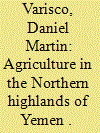

|
|
|
|
|
| Summary/Abstract |
The most fertile part of the Arabian Peninsula is the southwestern corner known historically as Yemen. The primary occupation of Yemen’s tribes over the centuries has been sedentary agriculture, stemming back to the pre-Islamic South Arabian kingdoms. Up until the revolution that toppled the Zaydī imamate in 1962, agricultural activities had change little over the centuries. After the revolution and civil war in the north, development aid poured into Yemen and access became available to modern machinery, especially diesel pumps for wells, and supplies. This article analyzes the transition from a household subsistence-based production to cash cropping in the northern highlands of Yemen. The focus is on the regions north and east of the capital Ṣanʿāʾ, which received less aid than the coastal region and southern highlands. Details are provided on the methods and production of agricultural crops in the period between 1975 and 1985, with an assessment of the potential future development of agriculture in a country currently torn apart by war.
|
|
|
|
|
|
|
|
|
|
|
|
|
|
|
|
| 2 |
ID:
033736
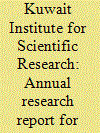

|
|
|
|
|
| Publication |
Kuwait, Kuwait Institute for Scientific Research, n.d..
|
| Description |
ix, 149p.pbk
|
|
|
|
|
|
|
|
|
|
|
|
Copies: C:1/I:0,R:1,Q:0
Circulation
| Accession# | Call# | Current Location | Status | Policy | Location |
| 019094 | 507.205367/KUW 019094 | Main | On Shelf | Reference books | |
|
|
|
|
| 3 |
ID:
139985
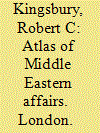

|
|
|
|
|
| Publication |
London, Methuen and co. ltd., 1964.
|
| Description |
vii, 117p.hbk
|
|
|
|
|
|
|
|
|
|
|
|
Copies: C:1/I:0,R:0,Q:0
Circulation
| Accession# | Call# | Current Location | Status | Policy | Location |
| 001785 | 956/KIN 001785 | Main | On Shelf | General | |
|
|
|
|
| 4 |
ID:
025425
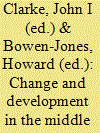

|
|
|
|
|
| Publication |
London, Methuen and co. ltd., 1981.
|
| Description |
xiii, 322p.;figHbk
|
| Standard Number |
0416710808
|
|
|
|
|
|
|
|
|
|
|
|
Copies: C:1/I:0,R:0,Q:0
Circulation
| Accession# | Call# | Current Location | Status | Policy | Location |
| 020522 | 910.1330956/CLA 020522 | Main | On Shelf | General | |
|
|
|
|
| 5 |
ID:
102056
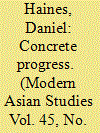

|
|
|
|
|
| Publication |
2011.
|
| Summary/Abstract |
The idea of 'developing' Sind has been a lynchpin of government action and rhetoric in the province during the twentieth century. The central symbols of this 'development' were three barrage dams, completed between 1932 and 1962. Because of the barrages' huge economic and ideological significance, the ceremonies connected with the construction and opening of these barrages provide a unique opportunity to examine the public presentation of state authority by the colonial and postcolonial governments. This paper investigates the way that ideas of 'development' and 'modernity' appeared in discourses connected with these ceremonies, in order to demonstrate that the idea of imposing 'progress' on a province considered 'backward' by the state administrators survived longer than the British regime which had introduced it. The paper begins with the historical links between water-provision and governance in Sind, before examining the way that immediate political concerns of the sitting governments were addressed in connection with the projects, demonstrating the ways in which very similar projects were cast as symbols of different political priorities. The last part of the paper draws out deeper similarities between the logic of these political expressions, in order to demonstrate the powerful continuity in ideologies of 'progress' throughout mid-twentieth century Sind.
|
|
|
|
|
|
|
|
|
|
|
|
|
|
|
|
| 6 |
ID:
152630
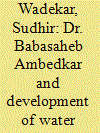

|
|
|
|
|
| Summary/Abstract |
Government of India decided to observe the birth anniversary of Dr. Babasaheb Ambedkar on April 14 as “Water Day” to sensitize people on managing the precious natural resource.1 Dr. Babasaheb Ambedkar is known as the ‘Architect of the Constitution of India. However, he is less known in the field of water resources.
|
|
|
|
|
|
|
|
|
|
|
|
|
|
|
|
| 7 |
ID:
116145
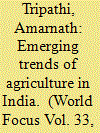

|
|
|
| 8 |
ID:
175228
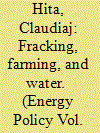

|
|
|
|
|
| Summary/Abstract |
Several studies note the large quantity of water used to hydraulically fracture oil and gas wells. We quantify this water use and its effects on water use for irrigating crops. For nine western states in 2017, water use in fracking represented 1.7 percent of water use in irrigation overall, but up to 55 percent in the Bakken shale of North Dakota, 28 percent in Oklahoma shale regions, and 12 percent in the Eagle Ford shale of Texas. However, in counties where the percentage of water use for fracking relative to irrigation is large, it is primarily because such counties have had minimal historical irrigation. We analyze the effect of state water policies governing the transfer of water from farming to fracking on water withdrawals for the two sectors. In North Dakota, which allowed farmers to forego irrigating and sell water to energy firms, each acre-foot of water used in fracking displaced about 1.1 acre feet from irrigation, thereby avoiding an increase in total withdrawals. Weaker evidence suggests an increase in irrigation in Oklahoma and Texas. Because of the lack of displacement in Texas and Oklahoma, concerns that fracking contributes to excess withdrawals in the present time may be warranted.
|
|
|
|
|
|
|
|
|
|
|
|
|
|
|
|
| 9 |
ID:
034535
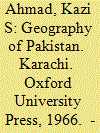

|
|
|
|
|
| Publication |
Karachi, Oxford University Press, 1966.
|
| Description |
216p.Hbk
|
|
|
|
|
|
|
|
|
|
|
|
Copies: C:1/I:0,R:0,Q:0
Circulation
| Accession# | Call# | Current Location | Status | Policy | Location |
| 002742 | 915.491/AHM 002742 | Main | On Shelf | General | |
|
|
|
|
| 10 |
ID:
039405
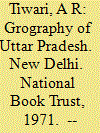

|
|
|
|
|
| Publication |
New Delhi, National Book Trust, 1971.
|
| Description |
135p.Hbk
|
|
|
|
|
|
|
|
|
|
|
|
Copies: C:1/I:0,R:0,Q:0
Circulation
| Accession# | Call# | Current Location | Status | Policy | Location |
| 007015 | 915.0954/TIW 007015 | Main | On Shelf | General | |
|
|
|
|
| 11 |
ID:
127594
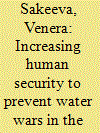

|
|
|
|
|
| Publication |
2013.
|
| Summary/Abstract |
The Ferghana Valley is shared by three Central Asian republics of Kyrgyzstan, Uzbekistan, and Tajikistan. Largely agrarian, the communities residing in the area are heavily dependent on the availability of water for irrigation. As a result of Soviet-backed imaginary border removal and the creation of new borders, the communities became highly vulnerable to state policies and are challenged in establishing relations with each other. The deteriorated environmental conditions, such as dry climate and drought, have only fueled the competition among households to ensure their access to the scarce water resources. Without timely and comprehensive intervention strategies, the region can be compared to a time bomb that could have irreversible consequences.
This article will examine the water problem in the Ferghana Valley from the perspective of a human security approach. In particular, it will analyze the trilateral spurious relations among environmental, economic, and community insecurities derived from the scarcity of water resources and lack of comprehensive water management strategies. To elaborate, it will look into how environmental insecurity has multidimensional impacts on economic and community security in the Ferghana Valley. This research with go on to identify the existing approaches to addressing the aforementioned issues and will scrutinize them to see whether or not they address human security of the communities residing in the Ferghana Valley. Subsequently, the article will propose an alternative solution that meets the principles of human security-friendly policies and will discuss strategies to improve alternative intervention within the framework of "do no harm."
|
|
|
|
|
|
|
|
|
|
|
|
|
|
|
|
| 12 |
ID:
123447
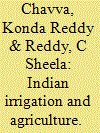

|
|
|
|
|
| Publication |
2013.
|
| Summary/Abstract |
The problems of agriculture in India are shared by many developing, densely populated countries, especially those located in the tropical belt of the planet. Konda Reddy Chavva and C Sheela Reddy point out that liberal reforms dictated by the IMF deprived farmers of much needed government support, prompting many to fall into a vicious cycle of indebtedness and cash crop monoculture, vulnerable to international price fluctuations.
|
|
|
|
|
|
|
|
|
|
|
|
|
|
|
|
| 13 |
ID:
118048
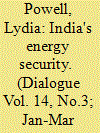

|
|
|
| 14 |
ID:
161116
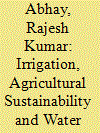

|
|
|
|
|
| Summary/Abstract |
Water is vital input for the development of agriculture, industry and service sectors. As the population increases, the stress is more on water utilisation. Surface water and groundwater are the two components of hydrological cycle which are available to man. Water, a biological necessity, is of great economic significance.
|
|
|
|
|
|
|
|
|
|
|
|
|
|
|
|
| 15 |
ID:
148515
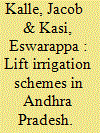

|
|
|
|
|
| Summary/Abstract |
Despite efforts by the Indian state to develop and maintain various irrigation strategies, many projects have not achieved the desired results, often due to systemic problems inherent in these initiatives. Meanwhile, the growing scarcity of water in South Asia propels new thinking about remedies. Based on detailed fieldwork, this article, which seems at first completely unrelated to matters of caste discrimination, assesses the sustainability of lift irrigation schemes (LIS) in Andhra Pradesh (AP). Asking critical questions about the management of such schemes, it also addresses the impact of new technologies on rural development, arguing that continuing technology-savvy engagement of the state in the irrigation sector is needed. While it is found that apart from issues of better management, increased use of solar energy could be a real boon for strengthening economic viability and environmental sustainability, the research identifies additional reasons, of a socio-political nature, which may explain why state support for marginal farmers in the area under examination is being withheld.
|
|
|
|
|
|
|
|
|
|
|
|
|
|
|
|
| 16 |
ID:
117093
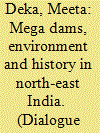

|
|
|
| 17 |
ID:
087681
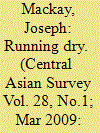

|
|
|
|
|
| Publication |
2009.
|
| Summary/Abstract |
The Aral Sea disaster is the result of Soviet-era irrigation policy. The collapse of the Soviet Union left the issue under the purview of international law. This essay addresses how this shift has affected attempts to slow or reverse the sea's depletion. Treaties on the non-navigation use of international watercourses and on the prevention of desertification have had little effect. While a number of regional instruments and arrangements have been brought to bear, they have also done little to reverse damage to the sea. Finally, attempts to regulate the issue through domestic law, as evidenced in the case of Kyrgyzstan, have done little as well. While some progress has recently been made under the auspices of the World Bank, it is not a result of international law. The conclusion is that the shift from domestic to international law has little improved the situation, and may have made matters worse.
|
|
|
|
|
|
|
|
|
|
|
|
|
|
|
|
| 18 |
ID:
041897
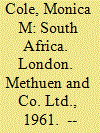

|
|
|
|
|
| Publication |
London, Methuen and co. ltd., 1961.
|
| Description |
xxx, 706p.Hbk
|
|
|
|
|
|
|
|
|
|
|
|
Copies: C:1/I:0,R:0,Q:0
Circulation
| Accession# | Call# | Current Location | Status | Policy | Location |
| 000642 | 916.8/COL 000642 | Main | On Shelf | General | |
|
|
|
|
| 19 |
ID:
189545
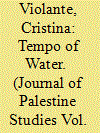

|
|
|
|
|
| Summary/Abstract |
During the Mandate period, Palestinian rural communities often shared their water sources proportionally in time-based rotations. Water use functioned as a temporal marker, embedded in the tempo of daily life. This article contrasts this way of distributing water with that of Zionist settlers and the British Mandatory administration, which typically measured water use in terms of volume. Volume-based measures, used by the British and by Zionist settlers, facilitated the commodification of water, transforming it into an object of investment for the development of colonial infrastructure, most notably irrigation and electricity. Time-based rotations, in contrast, were anchored in the movement of the sun and planets, seasonality (dry vs. wet season), and the needs of the community as a whole. The two approaches reflect different ways of relating to the environment and the natural world. Therefore, Zionist dispossession of water resources was not merely material, but it disrupted communal practices and obscured their associated temporalities.
|
|
|
|
|
|
|
|
|
|
|
|
|
|
|
|
| 20 |
ID:
172563
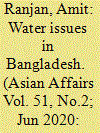

|
|
|
|
|
| Summary/Abstract |
At present, Bangladesh is self-sufficient in water. However, this self-sufficiency is by no means assured. Bangladesh's supplies of water are under threat through a combination of population growth, climate change, and pollution, sometimes caused by mismanagement. This article looks at the state of surface and ground waters in Bangladesh. It discusses the growing demand for water, pollution of the water bodies, and encroachment on the riverbeds, and the way in which this has been dealt with by Bangladesh's authorities. It argues that if things remain business-as-usual, it will become difficult for Bangladesh to continue with its high growth rate over the long term.
|
|
|
|
|
|
|
|
|
|
|
|
|
|
|
|
|
|
|
|
|